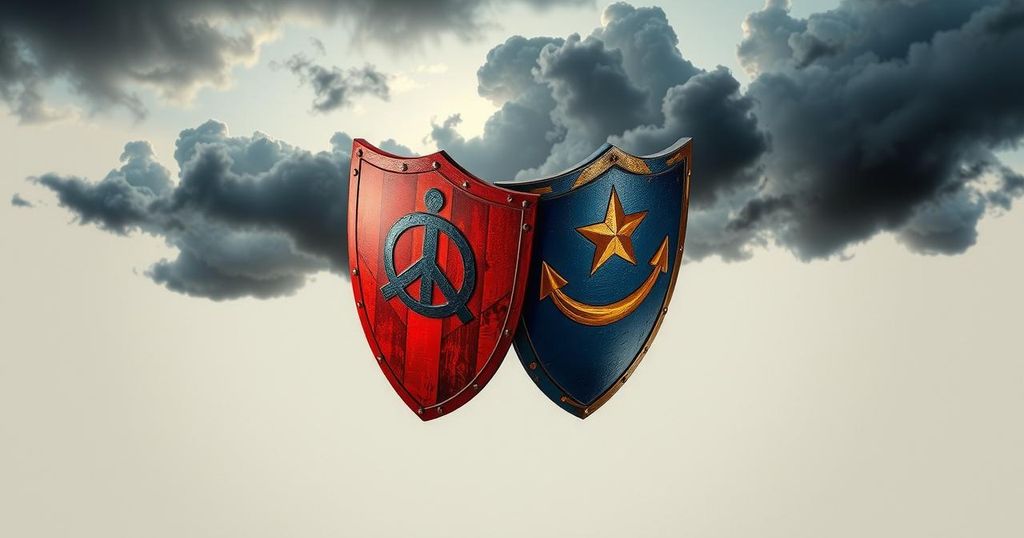Escalating Tensions: South Africa and Rwanda Clash Over DR Congo Conflict

Diplomatic relations between South Africa and Rwanda have deteriorated following accusations regarding a Rwanda-backed rebel group killing South African peacekeepers in DR Congo. President Ramaphosa has warned that further attacks would be seen as a “declaration of war,” while President Kagame accused South Africa of offensive operations against the Congolese people. The conflict highlights their tumultuous history marked by disputes over military involvement and differing narratives regarding peacekeeping.
Tensions between South Africa and Rwanda escalated following accusations from South African President Cyril Ramaphosa regarding the Rwanda-backed M23 rebel group, which allegedly killed South African peacekeepers in the Democratic Republic of Congo (DR Congo). With the rebels capturing Goma, South Africa warned that attacks on its troops would constitute a “declaration of war.” President Paul Kagame of Rwanda countered, accusing South Africa of engaging in “offensive combat operations” to assist the Congolese government against its citizens.
The conflict resulted in the deaths of 13 South African soldiers since last week, marking a continuation of violence in the region. This crisis reflects long-standing diplomatic strife between the two nations, last highlighted in 2014, when South Africa expelled Rwandan diplomats after an attack on an exiled dissident’s home. Although relations appeared to improve after a reconciliation visit in 2022, recent unrest has reignited tensions following the deployment of South African troops as peacekeepers in December 2023.
South Africa’s presence as part of the Southern African Development Community (Sadc) is aimed at curbing the activities of armed groups such as the M23. A recent communication from Ramaphosa indicated a mutual understanding with Kagame about the urgency of establishing a ceasefire, though discrepancies arose regarding the circumstances of the peacekeepers’ deaths. Ramaphosa emphasized that the attacks were perpetrated by the M23 and “Rwanda Defence Force (RDF) militia,” a statement that incited Kagame’s strong rejection of the narrative.
Kagame insisted that the Rwanda Defence Force is a professional military, not a militia, and accused Ramaphosa of dishonesty. He asserted that the Congolese army, rather than M23, was responsible for the deaths of South African soldiers. Kagame criticized South Africa’s military involvement, suggesting Rwanda will not tolerate any confrontation. The history of South African military engagement in DR Congo dates back to the 1990s and has been influenced by both humanitarian and economic interests, particularly its reliance on minerals from the DRC.
Despite South Africa’s previous military successes in DR Congo, its current capabilities to counter the M23’s resurgence are hampered by budget restrictions and diminishing military resources. Analysts urge introspection regarding whether South Africa should continue its military engagement in DR Congo, weighing the costs against the potential for further casualties. As Sadc plans to address the escalating situation, President Ramaphosa faces a critical decision regarding the safety and future of South African troops in the region.
The ongoing conflict in the Democratic Republic of Congo, particularly in its eastern regions, has attracted the involvement of various regional forces and nations, including South Africa and Rwanda. The M23 rebel group, which has gained notoriety for its military operations against the Congolese government, has been attributed with increasing levels of violence in the area, leading to international concern. For years, South Africa has participated in peacekeeping missions in the DRC as part of a broader mandate from regional organizations, primarily aimed at stabilizing a nation rich in resources but marred by conflict. The deteriorating relations between South Africa and Rwanda highlight a complex historical context, where diplomatic relations have often been strained due to differing political alignments and military engagements. The deaths of South African peacekeepers have intensified the scrutiny of military interventions and their implications for diplomatic relations in the region, posing challenges for policymakers on both sides.
In conclusion, the rising tensions between South Africa and Rwanda over the situation in DR Congo underscore the intricate dynamics of regional geopolitics and military engagement. Following the tragic loss of South African peacekeepers, both nations are positioned for potential confrontation, contrasting their diplomatic overtures with militaristic rhetoric. As the Southern African Development Community contemplates next steps, the future of peacekeeping in DR Congo remains uncertain amidst escalating violence and inter-state accusations.
Original Source: www.bbc.co.uk








